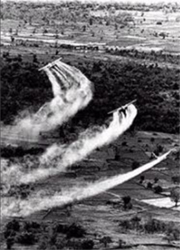Agent Orange Newsletter - 2022

| Download PDF (1.5 MB) |
In this issue:
- The PACT ACT and Vietnam Veterans
- Beyond Agent Orange: Other Tactical Herbicides
- Whole Health at VA
- Agent Orange and Presumptive Conditions
- Vietnam Era Veterans - Facts And Demographics
- VA Study Helps Us Understand Vietnam Theater Veterans’ Mental Health
- Profile on Environmental Health Clinician, Carl Dahl, MD
- New Certification Program On Military Exposures Now Available For Health Care Providers
The PACT ACT and Vietnam Veterans
The Honoring our Promise to Address Comprehensive Toxics Act of 2022, or PACT Act, will help Veterans in the areas of care for military exposures, presumptions, and research. For Veterans who served nobly in Vietnam or elsewhere where Agent Orange may have affected them, the PACT Act:
- Adds hypertension and the laboratory test finding of monoclonal gammopathy of undetermined significance (MGUS), which can be a precursor for the development of multiple myeloma in some cases, as presumptions.
- Adds several locations to the areas eligible for Agent Orange presumptions, including Guam, American Samoa, and Laos; and increased coverage in Thailand.
Beyond Agent Orange: Other Tactical Herbicides
From 1962 to 1971, during Operation Ranch Hand in Vietnam, the U.S. Air Force sprayed tactical herbicides for control of vegetation. These herbicides were named based on the color of their barrels. During the war, around 20 million gallons of Agents Green, Pink, Purple, Blue, White, Orange, Orange II, Orange III, and Super Orange were sprayed in South Vietnam.
Below is information on some of the other herbicides besides Agent Orange that were used:

Agent Blue - (cacodylic acid) was an arsenic-based chemical used to destroy rice. About 4 million gallons were sprayed. Among the current presumptions, bladder cancer might be most directly associated with potential exposure to this herbicide.
Agent Purple – consisted only of 2,4,5-T, which is the chemical that was contaminated with dioxin as a byproduct. About 500,000 gallons of Agent Purple were sprayed.
Agent White – was a 4:1 mixture of 2,4-D and picloram. About 5 million gallons were sprayed, some after the cessation of Agent Orange spraying.
Since many chemical agents were used as tactical herbicides, and since we are not able to measure exposure to these agents adequately, it is difficult to attribute specific health conditions to these chemical agents.
Learn more about Agent Orange and other herbicides.
Whole Health at VA

Are you interested in improving your “whole health,” meaning not just your physical health, but also your mental health, connection to others, sleep, energy, ways to find personal growth, and more? VA health professionals across the country are part of VA’s transformation to a Whole Health system of care, which focuses on personalized health plans based on Veterans’ values, needs, and goals and supporting overall well-being and health.
VA Connection Plans, a Whole Health intervention program offered through the VISN 5 Mental Illness Research, Education, and Clinical Center, is a recently completed pilot program that helped Veterans set goals for their body, mind, and social connections. Martin Allen, a Navy and Air Force Veteran and post-9/11 expert with VA’s Health Outcomes Military Exposures, was contacted by VA Connection Plans to participate.
Allen joined the program and set goals to control his health challenges, destress, and improve his health during the pandemic. The program helped him lose 50 pounds, add walking to his exercise routine, and begin transcendental meditation.
“The VA Connection Plans program helped me to focus on my health goals and implement them,” said Allen. “Health care providers helped me with both my physical and mental health,” he added.
Though the VA Connection Plans program is on hiatus, you can learn more about Whole Health, create a personalized health plan, and talk to your health care provider about how you can incorporate Whole Health into your care. More Whole Health resources are available at Whole Health Home, and you can find out how to get started at Get Started with Whole Health.
Agent Orange and Presumptive Conditions
Vietnam Veterans are automatically presumed to have been exposed to herbicides during their service and are qualified for certain VA benefits. There are specific medical conditions presumed to be related to Agent Orange exposure.
They are:
- AL Amyloidosis
- Chronic B-cell Leukemias
- Chloracne
- Diabetes Mellitus Type 2
- Hypertension
- Hodgkin’s Disease
- Ischemic Heart Disease
- Monoclonal gammopathy of undetermined significance (MGUS)
- Multiple Myeloma
- Non-Hodgkin’s Lymphoma
- Parkinson’s Disease
- Peripheral Neuropathy, Early- Onset
- Porphyria Cutanea Tarda
- Prostate Cancer
- Respiratory Cancers
- Soft Tissue Sarcomas.
With the Fiscal Year 2021 National Defense Authorization Act, VA added three new conditions to the presumptive conditions to the list:
- Bladder cancer
- Hypothyroidism
- Parkinsonism (also known as Parkinson-like conditions)
Vietnam Era Veterans - Facts And Demographics
The Vietnam War officially began on August 5, 1964, and ended on May 7, 1975. Below are some facts and demographic features of Veterans who served during this time:

- Approximately 2.7 million Veterans served in the Republic of Vietnam out of the 8.7 million Americans who served in the Armed Forces during the Vietnam era.
- Although segregation in the military officially ended in 1948, the Vietnam War was the first major conflict in which military units were fully integrated.
- Approximately 7,500 women were stationed in Vietnam during the war.
- More than 300,000 Veterans were wounded during the Vietnam War.
- VA’s Veteran Population Projection Model estimates that there are approximately 6.1 million living Vietnam War-era Veterans, as of 2021.
- The median age of Vietnam War era Veterans is approximately 73 years old.
- As of November 2020, nearly 1.6 million Vietnam Veterans were being served by the various programs of the Veterans Benefits Administration. An additional 320,000 surviving spouses, nearly 5,000 children, and 542 parents of Vietnam War Veterans were also receiving VA benefits.
Thanks to all our Vietnam Veterans who served and for their sacrifices.
Source: Vietnam War Veterans, and honoring all who served: Memorial Day 2021 - VAntage Point
VA Study Helps Us Understand Vietnam Theater Veterans’ Mental Health
Vietnam War Veterans faced hardships during the war and upon returning home that could have affected their mental health for many years after the war. In 2016-2017, VA’s Health Outcomes Military Exposures, Epidemiology Program, conducted the Vietnam Era Health Retrospective Observational Study (VE-HEROeS), the first nationwide survey that focused on both the physical and mental health of Vietnam War Veterans in over 30 years.
We mailed survey questionnaires to over 40,000 Vietnam theater and non-theater Veterans. Nearly 7,000 surveys were sent to U.S. non-Veterans. Using established survey research administration methods, these mailings resulted in a 45% response rate for Veterans (6,735 theater Veterans and 12,131 non-theater Veterans responded) and a 67% response rate for non-Veterans (4,530 responded). This survey collected participants’ health, sociodemographic, and service-related information. One of the important topics we could assess using these survey data was an assessment of the mental health status of theater Veterans (i.e., those who served in the Vietnam theater of operations – Vietnam, Cambodia, and Laos) to see whether they are experiencing psychological issues today that may be associated with their war-time experiences
To study mental health status, we compared Veterans’ mental health by level of Vietnam theater service, i.e., we compared the mental health of theater Veterans to the mental health of Veterans who served elsewhere (e.g., U.S., Europe) during the war and also to sex- and age-matched, U.S. non-Veterans who had no military service.
We looked at four mental health outcomes that included overall mental health functioning (i.e., mental health-related quality of life), probable posttraumatic stress disorder (PTSD), psychological distress, and depression. We examined the prevalence of these outcomes in each of the three groups and through regression analyses obtained insights into the associations between level of military service and these mental health outcomes after adjusting for sociodemographic and other health and service characteristics. We also looked at these relationships in regard to race/ethnicity. The following is a summary of what we found:
- Mental health problems persisted among Vietnam theater Veterans even many decades after the end of the Vietnam War.
- PTSD, depression, psychological distress, and poor mental health functioning were more prevalent for Vietnam theater Veterans than non-theater Veterans and non-Veterans.
- Poor mental health was generally more evident in minority Veterans, particularly for Hispanics.
Our study showed that Vietnam War theater Veterans continue to suffer mental health problems as they approach their 8th decade of life. Thus, the continued surveillance of their mental health status and health care needs is of critical importance.
Find the abstract of the article on this study, The mental health of Vietnam theater Veterans-the lasting effects of the war: 2016-2017 Vietnam Era Health Retrospective Observational Study, on the National Library of Medicine’s PubMed.
Profile on Environmental Health Clinician, Carl Dahl, MD

Dr. Carl Dahl, a Vietnam Veteran, is dedicated to caring for fellow Vietnam Veterans. Dr. Dahl has been a health care provider for more than 50 years and now works at the Golden Colorado VA Clinic as an Environmental Health Clinician, focusing on Agent Orange Registry exams and Airborne Hazards and Open Burn Pit Registry exams.
Agent Orange Registry exams are free exams that help eligible Vietnam War-era Veterans understand their health and help VA to better understand and respond to their health needs. As a part-time VA employee, Dr. Dahl conducts about 4 Agent Orange Registry exams per week, and 15-16 Agent Orange Registry exams per month.
“It’s an opportunity to evaluate Veterans who have served in Southeast Asia during that period of time and possibly find conditions or diagnoses that could have a relationship to their exposure to Agent Orange,” said Dahl.” If we can find conditions that have been diagnosed, and that are presumptively related or associated, it is an opportunity to allow these Veterans to make a claim for a condition, he added.
“I have a pretty good connection to Veterans who served in Vietnam,” said Dahl. He joined the Navy in 1974 as a doctor. He was deployed at Oakland Naval Hospital for two years, and then off the coast of Vietnam in April 1974 for the evacuation out of Saigon and South Vietnam. “I ended up on the Liberty Ship with 3,600 Vietnamese citizens, and my job was to take care of them and transport them to Guam,” he said. He left service after two years as a lieutenant commander.
After military service, Dahl completed a fellowship at the University of Colorado. He worked in civilian practice as a gastroenterologist, and a liver specialist from 1978-2011. Next, he was invited to work for Compensation and Pension at VA, and then began focusing on environmental medicine in 2019, conducting registry exams for Veterans.
Dahl also has another military connection – he was named after his mother’s youngest brother, who joined the Navy on December 7, 1939, and was killed exactly two years later at Pearl Harbor. “About a year after he died, I was born,” Dahl said. Helping Veterans through registry exams is a service that Dahl finds fulfilling. “I find it rewarding to be able to do exams for them,” he said.
Dahl encourages eligible Veterans to get an Agent Orange Registry exam. “It’s totally free. It’s an opportunity to get a good evaluation as to current health conditions,” he said. Other benefits to joining are the opportunity to learn about a possible presumptive condition so you can make a claim, to learn about your health even if you are not enrolled in the VA system, and to get a comprehensive evaluation, he added.
To sign up for an Agent Orange Registry exam, contact an Environmental Health Coordinator near you. A coordinator will help you schedule an exam with a provider.
New Certification Program On Military Exposures Now Available For Health Care Providers
VA and the American College of Preventive Medicine (ACPM) created a formal certification program that gives health care providers the skills and knowledge needed to effectively identify, treat, and manage the effects of possible environmental exposures in Veterans.
The Level I certification is a five-module program developed by VA’s War Related Illness and Injury Study Center. It covers the following topics: assessing deployment-related environmental exposures, airborne hazards, Gulf War illness, chronic multi-symptom illness, depleted uranium, and toxic embedded fragments. As of August 2022, more than 100 professionals, including many VA clinicians, completed the certification program, and the number grows daily.
VA and ACPM are now developing an advanced Level II certification program that builds on the Level one certification. The content will include a series of case studies and clinical exposure scenarios to equip providers with the ability to share, disseminate knowledge, and strengthen their skills in military exposures.
You can encourage your VA providers to sign up for this free certification program.
Download free viewer and reader software to view PDF, video and other file formats.




















